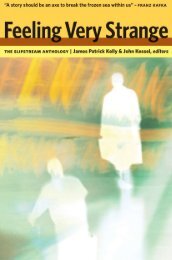The Curse of the Wer.. - Site de Thomas - Free
The Curse of the Wer.. - Site de Thomas - Free
The Curse of the Wer.. - Site de Thomas - Free
You also want an ePaper? Increase the reach of your titles
YUMPU automatically turns print PDFs into web optimized ePapers that Google loves.
8 THE CURSE OF THE WEREWOLF<br />
(as Gilles Deleuze and Félix Guattari have characterized this vision<br />
<strong>of</strong> masculinity) has competed with imagery <strong>of</strong> <strong>the</strong> ‘beast within’ in<br />
Western characterizations <strong>of</strong> masculinity, and in such contexts <strong>the</strong><br />
werewolf has <strong>of</strong>ten been positioned as a source <strong>of</strong> positive i<strong>de</strong>ntification<br />
that recognizes <strong>the</strong> connections between manhood and primal nature.<br />
Western masculinity is thus marked by <strong>the</strong> careful policing <strong>of</strong> <strong>the</strong><br />
boundaries between nature and culture, a project that <strong>the</strong> werewolf<br />
has been well positioned to represent.<br />
As Chapter 5 explores, feminists have also experimented with <strong>the</strong><br />
revaluing or ‘valorization’ <strong>of</strong> <strong>the</strong> feminine, nature, <strong>the</strong> unconscious,<br />
and o<strong>the</strong>r categories that have constituted <strong>the</strong> negative, ‘o<strong>the</strong>red’ poles<br />
<strong>of</strong> key oppositions. In keeping with feminist critiques (following <strong>de</strong><br />
Beauvoir) <strong>of</strong> <strong>the</strong> ways in which women have been exclu<strong>de</strong>d from ‘universal’<br />
subjectivity, such an approach envisions a more inclusive un<strong>de</strong>rstanding<br />
<strong>of</strong> selfhood, one that is less reliant on <strong>the</strong> construction <strong>of</strong> ‘self’<br />
through <strong>the</strong> exclusion <strong>of</strong> ‘o<strong>the</strong>rs’. Fiction about female werewolves,<br />
especially by authors sympa<strong>the</strong>tic to feminism, has exemplified this<br />
process, by celebrating lycanthropy as an ability that enriches ra<strong>the</strong>r<br />
than un<strong>de</strong>rmines <strong>the</strong> conscious experience <strong>of</strong> reasoning subjectivity.<br />
In such texts, <strong>the</strong> access to nature, embodiment and <strong>the</strong> unconscious<br />
that emerges through lycanthropy is configured as a powerful resource<br />
for self-<strong>de</strong>velopment. Ultimately, however, such representations have<br />
not posed a challenge to dualistic subjectivity, because, <strong>de</strong>spite <strong>the</strong><br />
revaluation <strong>of</strong> certain poles, <strong>the</strong>y reiterate <strong>the</strong> oppositional logic that<br />
has structured Western thought since <strong>the</strong> Enlightenment.<br />
Postmo<strong>de</strong>rnist (and especially postmo<strong>de</strong>rnist feminist) approaches<br />
to subjectivity have pursued <strong>the</strong> speculative dimension <strong>of</strong> such work<br />
by seeking to <strong>the</strong>orize alternative or ‘better’ ways <strong>of</strong> being, but have<br />
also sought to avoid <strong>the</strong> mo<strong>de</strong>rnist recapitulation <strong>of</strong> oppositional frameworks.<br />
Donna Haraway’s celebration <strong>of</strong> <strong>the</strong> ‘hybrid’ subjectivity <strong>of</strong> <strong>the</strong><br />
cyborg has been highly influential in this regard, and has led to <strong>the</strong><br />
celebration <strong>of</strong> monsters and cyborgs as examples <strong>of</strong> subjects who refuse<br />
to be constrained by <strong>the</strong> limitations imposed upon and by <strong>the</strong> dualistic<br />
mo<strong>de</strong>rnist self. This focus has led to extensive critical engagement with<br />
<strong>the</strong> genres <strong>of</strong> horror and science fiction, which have been scoured for





